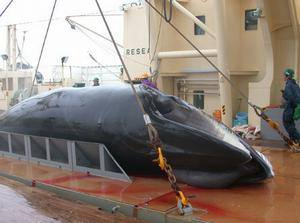
國際捕鯨委員會的「未來行動小組」於22日發表一份提案,擬准許重啟商業捕鯨。該委員會的商業捕鯨禁令自1986年實施後,一直維持至今。這次妥協目的是要解決捕鯨委員會內,反對商業捕鯨與想要捕殺鯨魚的成員國之間長期僵持的協商進程。
「未來行動小組」的這份「共識決策」草案將允許目前依條約中「研究」條款捕鯨的少數國家,未來在所提議的管理機制下進行獵捕。這些國家分別為日本、挪威、冰島與法羅群島(Faroe Islands),其在一年期間共捕殺約1500隻鯨魚。原住民維生性質的捕鯨則亦將獲准持續進行。
這份草案讓捕鯨委員會的88個成員國均得以在委員會管制下從事捕鯨。現階段,對於依條約中異議/保留條款進行捕鯨,或依特別許可而進行捕鯨,亦即所謂的「研究捕鯨」行為,國際捕鯨委員會都沒有任何管制。
提案中設置有捕捉限額,在10年期間「保持在永續程度」,雖然這些額度的大部份並未在草案文件中載明,但都被標註「將待決定」。草案中解釋,捕獲量將會自現在的水準「大幅度」減少。
捕鯨委員會提案說明,共識決策的基本要素是委員會將會「關注在回復鯨魚消退的產量,並針對重要議題採取行動,如混獲、氣候變遷與其他環境威脅」。
環保團體對此提案感到憤怒;國際綠色和平組織阿姆斯特丹辦公室22日呼籲成員國要斷然拒絕提案,並描述其為深具危險地退步回到20世紀的狀況,當時鯨魚被捕獵至幾乎滅絕。
綠色和平反捕鯨行動主任約翰‧佛里茨爾(John Frizell)說:「這項提案鼓勵了日本這幾十年來,在國際捕鯨委員會與南大洋鯨魚禁捕區中理應受譴責的行為。」
「我們身處在捕鯨與海洋保育的重要交會點,」佛里茨爾說:「重啟商業捕鯨將不僅會是鯨魚的災難,還會為國際海洋保育工作帶來震盪,讓其他快速減少的物種,如鮪魚和鯊魚,其保護工作的難度更是大大提高。」
世界自然基金會國際總部物種計畫經理溫蒂‧艾略特(Wendy Elliott)表示:「世界上若是有單一個地方應當受到完全保護,那就是南大洋。我們需要的是使南大洋一切的捕鯨活動消失,包括日本以『科學研究』粗糙掩飾的商業捕鯨。」
「然而現在這個協議草案,可能讓日本甚至更容易在生態獨特地區持續補鯨。」艾略特說道。
捕鯨委員會小組成員國將在3月份開會時,就此共識決策草案進行討論。而提案是否將被採行,將是在委員會下次的全員會議中討論,時間是在6月,於摩洛哥阿加迪爾(Agadir)舉行。
A working group of the International Whaling Commission today released a draft proposal that would allow the return of commercial whaling. An IWC moratorium on commercial whaling has been in place since 1986.
The compromise is aimed at unblocking the long-stalled negotiation process between IWC member countries opposed to commercial whaling and those that want to kill whales.
The draft Consensus Decision by the Small Working Group on the Future of IWC would allow only the countries that currently take whales under the "research" provisions of the treaty to hunt them under the proposed management regime. Those countries are Japan, Norway, Iceland and the Faroe Islands, which together kill some 1,500 whales a year. Indigenous subsistence whaling also would be allowed to continue.
The draft proposal would bring whaling by all 88 member countries under the control of the IWC. Currently, the IWC has no control over whaling under objection/reservation to the treaty or whaling under special permit, the so-called "research whaling."
The proposal establishes caps of takes that are "within sustainable levels" for a 10 year period, although most of those quotas are not specified in the draft document but are marked "TBD," to be . The draft comments that catches would be reduced "significantly" from current levels.
The IWC proposal states that a fundamental component of the Consensus Decision is that the commission will "focus on the recovery of depleted whale stocks and take actions on key issues, including bycatch, climate change and other environmental threats."
But environmental groups are outraged by the proposal.
From its office in Amsterdam today, Greenpeace International called for the proposal by to be rejected out of hand, describing it as a dangerous throwback to the 20th century when whales where hunted to near extinction.
"The proposal rewards Japan for decades of reprehensible behavior at the International Whaling Commission and in the Southern Ocean Whale Sanctuary," said John Frizell, Head of the Greenpeace Whales Campaign.
"We are at a critical junction for both whaling and ocean conservation," said Frizell. "A return to commercial whaling would not only be a disaster for whales but will send shock waves through international ocean conservation efforts, making it vastly more difficult to protect other rapidly-declining species such as tuna and sharks."
"If there is one single place in the world where whales should be fully protected, it is the Southern Ocean," said Wendy Elliott, species manager at WWF-International. "What we need is to eliminate all whaling in the Southern Ocean, including Japanese commercial whaling thinly disguised as 'scientific research.'"
"But what we have now is a deal which could make it even easier for Japan to continue taking whales in this ecologically unique place," Elliott said. "
The draft Consensus Decision will be discussed by a group of IWC countries at a meeting in March, with the intention that it will be adopted by the IWC at its next full meeting in Agadir, Morocco in June.
全文及圖片詳見:ENS



